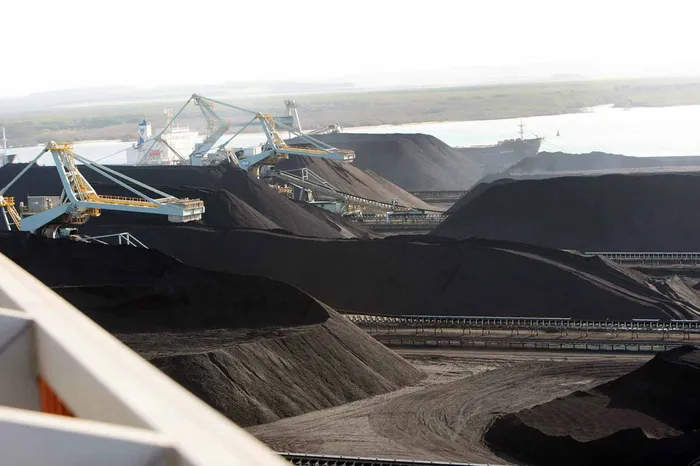Death in the Air: The silent slaughter of South Africans
Opinion

For over 150 years now, South Africa has relied on coal as its dominant energy source. The proliferation of the mining industry around 1870 propelled large-scale exploitation and rampant, unchecked industrialisation.
Image: Simphiwe Mbokazi / Independent Newspapers.
LET’S be blunt; the air in South Africa is deadly, and the government is doing nothing about it!
Just days ago, Greenpeace Africa confronted the Department of Forestry, Fisheries and the Environment in Pretoria. With gas masks and tombstones in hand, activists spotlighted the deadly toll of pollution: over 42 000 South Africans die prematurely each year due to toxic air. This wasn’t just for spectacle; it was about the survival of our entire nation.
In 2023 alone, air pollution killed at least 42 000 people, including more than 1 200 children under five. The economic toll alone equates to about R1 trillion per year, about 14% of our GDP. This crisis is the direct result of unchecked industrial emissions and government inaction.
For over 150 years now, South Africa has relied on coal as its dominant energy source. The proliferation of the mining industry around 1870 propelled large-scale exploitation and rampant, unchecked industrialisation. Even after the end of the consciousless apartheid regime, Eskom continues to power the country mainly with coal.
According to the International Trade Administration, South Africa boasts some of the highest solar radiation levels globally; as such, the use of solar energy is the most readily accessible resource. Yet, South Africa’s struggle to implement renewable energy sources has been, at best, lacklustre.
In fact, this can be largely attributed to those in national leadership, who have allowed impediments such as mismanagement of funds, shady investments, and monopolistic market powers such as Eskom to thrive in our democratic society. And the consequences are instantaneous death.
South Africa didn’t just “end up” with toxic air. It was engineered. For decades, corporate and political elites have backed coal dependence while ignoring science and human suffering. Eskom, Sasol, and other extractive giants have polluted freely, shielded by political cover. Environmental laws are ignored, emissions limits are exceeded, and accountability is almost nonexistent.
Environmental injustice here isn’t an unfortunate side effect; it's a deliberate consequence. It’s the result of decades of deregulation, greed, and a government more aligned with polluters than with its people. This issue is beyond betrayal. It is political violence.
South Africa’s most vulnerable communities are hit first and hardest. Black and working-class neighbourhoods are overwhelmingly located near coal-fired power plants, refineries, and chemical factories. These sites pollute with near-total impunity. These aren’t just emissions; they’re economic decisions made at people’s expense.
This is what environmental collapse looks like when it’s local: poor communities suffocating near coal plants, children developing asthma before they can spell it, rampant heart disease and neurological disorders spilling out of overcrowded clinics and dilapidated hospitals.
People living near pollution hotspots are sicker, poorer, and much more likely to die young. We’re not short on reports; we’re drowning in them. What’s worse is that this clean air is a basic human right, yet there’s silence from the government whilst thousands drop dead, year in and year out.
Even when communities win in court, enforcement is minimal. Regulatory bodies are underfunded, under-resourced, or toothless by design. Behind every ignored scientific warning is a boardroom profiting from pollution.
If toxic air is the symptom, the deeper disease is an extractive economy: pollute, exploit, abandon. Mines rupture the earth. Rivers and dams become industrial dumps. Jobs are dangled like bait while workers inhale death.
This is “environmental apartheid”. Suburbs get air purifiers and boreholes. Townships get rashes, nosebleeds, and hospital bills. The same inequality that defined our past is killing us now — only this time, you can smell it from up close.
Air pollution is not just an environmental issue; it’s a racialised one. Black and Coloured communities, historically pushed to the margins, now live closest to the filth. They breathe the dirtiest air, get the least healthcare, and suffer the worst outcomes. Wealthier, dominantly white communities live in cleaner areas, with private care and countless protective measures.
The poor don’t have air purifiers. They have no buffer. Only daily exposure, deteriorating health, and the injustice of a system that made clean air a luxury, not a right.
This is not just about the dirty industry. It’s about government failure. The Department of Forestry, Fisheries and the Environment has the tools and the constitutional duty to act. But tools mean nothing in the hands of those who are compromised, complicit, or too cowardly to use them.
We must stop asking communities to be “resilient”. Resilience has become a euphemism for abandonment. People shouldn’t have to adapt to poisoned air or bury children whose lungs gave out before they got to school.
We deserve investments in renewables, clean air, and public health. Air pollution isn’t a background issue; it’s a political emergency. It’s life or death — now, and into the future.
We cannot afford another decade of poisoned air while the government lallygags.
We desperately need radical transformation, not just in how we power our country, but in who gets to decide. Until that happens, the fight will continue, in courtrooms, in communities, and on the streets.
Because breathing shouldn’t be a privilege.
* Tswelopele Makoe is a gender and social justice activist and editor at Global South Media Network. She is a researcher, columnist, and an Andrew W Mellon scholar at the Desmond Tutu Centre for Religion and Social Justice, UWC.
** The views expressed here do not reflect those of the Sunday Independent, IOL, or Independent Media.